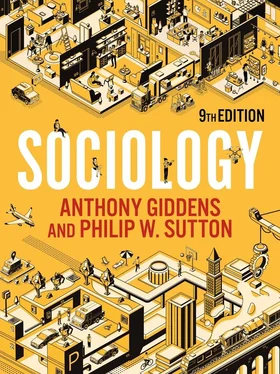It seems obvious that successful biomedicine is an example of globalization spreading outwards from the ‘West’ to ‘the rest’. But is this correct? Are there medical success stories moving in the opposite direction? And, if there are, have they changed in the process or are they changing biomedical practice? The article below approaches this issue by exploring the travels of Indian ayurvedic medicine. Is there a ‘global ayurveda’? Read the paper and answer the questions that follow.
Sujatha, V. (2020) ‘The Universal and the Global: Contextualizing European Ayurvedic Practices’, Society and Culture in South Asia , 6(1): 52–73.
1 What methods were used in this research? Where was it carried out?
2 The author identifies three phases in the movement of ayurveda into European societies since the 1980s. What are they?
3 Which elements of ayurveda are said to have global potential? Why are some elements unlikely to be adopted in Europe?
4 Outline how ayurveda made its way into Europe. Why was the method of transmission particularly significant in relation to its reputation and take-up?
5 ‘The case of ayurvedic medicine in Europe is an example of glocalization.’ List some reasons for and against this proposition, drawing on this paper and the ideas of Roland Robertson (discussed in this chapter).
 Thinking it through
Thinking it through
If globalization is real and effective, then academic research is not immune from its impact. For example, we might expect that social science publications in the first half of the twentieth century would be dominated by European and North American scholars, but, by the start of the twenty-first century, research from all around the world would be making an equal impact.
Read this article:
Mosbah-Natanson, S., and Gingras, Y. (2014) ‘The Globalization of Social Sciences? Evidence from a Quantitative Analysis of 30 Years of Production, Collaboration and Citations in the Social Sciences (1980–2009)’, Current Sociology , 62(5): 626–46.
Set out the paper’s main argument that Europe and North America remain the dominant forces in the production of social scientific journal articles and consider the following:
Why have other regions not made the kind of breakthrough we might expect?
What evidence do the authors introduce to show that researchers in ‘peripheral’ regions still show deference to those from the ‘centre’?
How successful is this model of ‘centre–periphery’?
What, if anything, do we learn about globalization from this paper?
 Society in the arts
Society in the arts
Music is often the first art form to embody socio-economic change, in production methods, styles, content and geographical spread. We might expect to find that globalization is easier to see in musical trends than other forms and perhaps even more so in popular music, which more readily allows for mixing and blending of regional traditions and musical trends. One simple example is that songwriters, singers, bands, producers and distributors from around the world collaborate in ways that were previously more difficult.
Listen to a 2019 podcast debate on this subject here and address the questions below:
‘The 2010s: The Globalization of Music’, 31 October 2019, www.npr.org/2019/10/07/767904453/the-2010s-the-globalization-of-music?t=1582886387558.
What examples and artists are discussed that may signal the erosion of single-genre pop music today?
What evidence is there that collaborations and mixing/blending of styles in music illustrates a shift in power relations away from the USA and Europe?
How has the emergence and rapid growth of digital technology, music streaming and online environments facilitated the globalization of music?
If Western-based artists adopt the musical style of, say, Korean K-pop, is this an example of globalization, of glocalization, or simply a form of appropriation by the more powerful cultures?
Thinking back to our discussion of economic, political and cultural forms of globalization, what evidence is there that one of these forms is the primary driver of the globalization of music?
 Further reading
Further reading
The subject matter of this chapter is so wide-ranging that a single book will not cover it. But there are two formats you should find useful. First are those that cover global human history and the development of societies. Noel Cowen’s (2001) Global History: A Short Overview (Cambridge: Polity) is a well-written, concise, yet comprehensive account which assumes no specialist knowledge. Bruce Mazlish’s (2006) The New Global History (London: Routledge) traces global history and globalization processes over the long term, linking historical and sociological approaches.
Second are those books that deal with current theories and debates on globalization. You could try Manfred B. Steger’s (2017) Globalization: A Very Short Introduction (Oxford: Oxford University Press) or George Ritzer and Paul Dean’s (2015) Globalization: A Basic Text (2nd edn, Oxford: Wiley Blackwell), which covers global governance and other key aspects of the main debates. Luke Martell’s (2017) Sociology of Globalization (2nd edn, Cambridge: Polity) is a wide-ranging review.
Paul Hirst, Grahame Thompson and Simon Bromley’s (2009) Globalization in Question (3rd edn, Cambridge: Polity) provides an essential critique. Paul Hopper’s (2007) Understanding Cultural Globalization (Cambridge: Polity) does exactly what it says, and Thomas G. Weiss’s (2013) Global Governance: Why? What? Whither? (Cambridge: Polity) is a lively discussion of this subject. Collectively these three cover some key economic, cultural and political aspects of globalization.
The Globalization Reader (2020) (6th edn, ed. Frank J. Lechter and John Boli, Chichester: Wiley) is a very comprehensive collection covering a broad range of subjects, and A Dictionary of World History (2006) (2nd edn, Oxford: Oxford University Press) is a useful resource.
 Internet links
Internet links
Additional information and support for this book at Polity: www.politybooks.com/giddens9
TimeMaps information on hunter-gatherers – covers hunter-gatherers, agrarian societies and early civilizations: www.timemaps.com/hunter-gatherer
The 1999 Reith Lectures – Anthony Giddens on ‘The runaway world’: http://news.bbc.co.uk/hi/english/static/events/reith_99/
International Forum on Globalization – an alliance of activists, scholars and researchers interested in globalization processes: www.ifg.org/
Yale Center for the Study of Globalization – exactly what it says it is: https://ycsg.yale.edu/
Centre for Research on Globalization – Canadian-based ‘think site’ with lots of comment by researchers and academics: www.globalresearch.ca/
Global Policy Forum – monitors policy-making at the United Nations: www.globalpolicy.org/
UCL Global Governance Institute – UCL centre for cross-disciplinary research on tackling global social problems: https://www.ucl.ac.uk/global-governance/
Читать дальше

 Thinking it through
Thinking it through Society in the arts
Society in the arts Further reading
Further reading Internet links
Internet links










